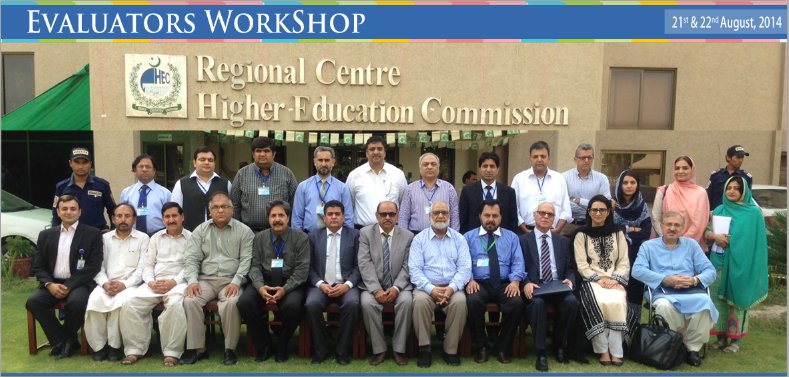Workshops
Peer reviewers Workshop

Venue: Higher Education Commission, Lahore 54000, Pakistan | City: Lahore, Pakistan
Resource Persons
![]()
![]()
02 Days Advance Level Training Workshop for the evaluators of National Business Education Accreditation Council (NBEAC) from 21st-22nd Aug 2014 organized by QAA -HEC.
A two-day training workshop for the evaluators of National Business Education Accreditation concluded on Friday 22nd August at Higher Education Commission Regional Centre Lahore. There were eight resource persons proceeded as a moderators during the sessions. Dr. Zafar Iqbal Jadoon, Dr. Zahoor Hassan Syed, Professor LUMS, Prof. Dr. Rasheed Kausar, Pro Rector, University of Management Technology Lahore, Prof. Amanullah Khan, Dean Management Sciences Riphah University, Dr. Sadia Nadeem, Associate Professor, FAST NU, Islamabad, Dr. Zaki Rashidi, senior Faculty SZABIST, Karachi , Dr. Farooq E Azam Cheema, Dean Management Sciences, Bahria University Karachi and Dr. Hanif Muhammad, Consultant were the resource persons. This workshop is designed for the experienced evaluators of NBEAC with the purpose of bringing all evaluators on one page about NBEAC standards and accreditation process. There were almost 30 evaluators who are invited to participate in the 02 day workshop. Eight discussion sessions (45 mins-1 hr app.) on RUBRIC were arranged to identify the gaps in RUBRIC standards and NBEAC proformae.
The objectives of the workshop are to share the best practices and experiences during peer review process (Lessons learnt after completing 35 Peer Review Visits). How to manage possible conflicts during the visit? And to improve and review the existing peer review process.
The Higher Education Commission, Quality Assurance Agency under the leadership of Dr Rafiq Baloch endeavors to build the capacity of individuals and institutions to enable them to adopt best practices of International bodies in the teaching–learning process. The purpose of this workshop was improve the relevant skills of Program Evaluators (PE’s) in undertaking accreditation inspection based on prescribed standards, criteria and procedures.To compare the NBEAC framework of accreditation with International accreditation frameworks and share experiences on best practices for accreditation of business degree programs and their effectiveness in quality enhancement.
The participants of the workshop were mostly senior faculty members, Deans and HoD’s of public and private sector universities. This workshop proved to be an excellent opportunity for all the participants and the resource person to share their valuable academic experiences; views to make the external evaluation process more transparent, consistent and credible.
Workshop provided the insight of NBEAC Accreditation model and the best practices of peer review visits. Participants discussed the questions to be asked during the peer review visit to collect evidence to verify the information provided in Self Assessment report of the Business School.
On the opening speech Dr Hasan Sohaib Murad, Chairman NBEAC briefed the audience about the evolution of NBEAC standards during three years. He appreciated the involvement of evaluators in NBEAC accreditation process. HE mentioned that now NBEAC has the repository of trained evaluators having the experience gained through faculty/ student meetings during peer review visit. The voluntary process of program accreditation by the NBEAC is the key element to enhance the quality of business education. The ceremony concluded with the distribution of certificates amongst participants by the chief guest.
Map
Powered by iCagenda
About NBEAC
NBEAC has three main functions: accreditation, training and networking. In its accreditation function, it develops and implements standards to improve the quality of business education in Pakistan. In its training function, it provides opportunities to faculty and managers to learn about quality standards and related matters. In its networking function, it provides a forum for business education professionals to learn from each other through conferences and seminars.


